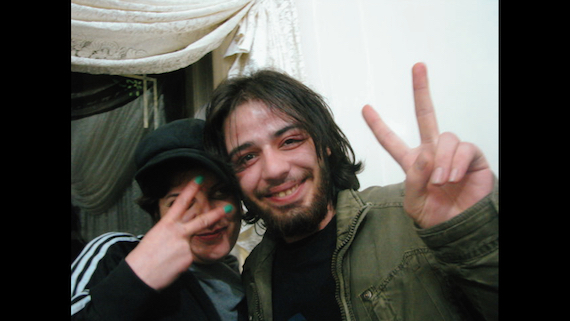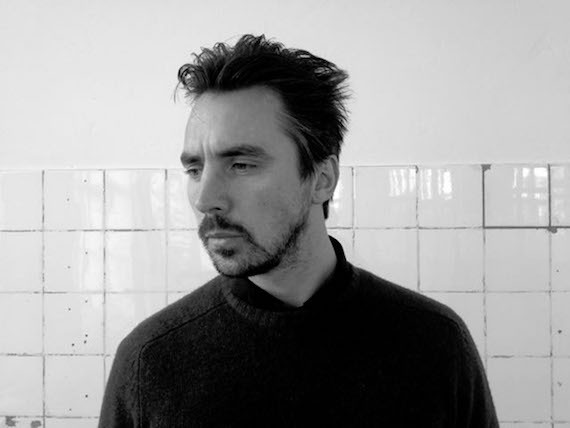This year's Venice Days sidebar at the Venice Film Festival kicked off with a film titled The War Show, co-directed by Danish filmmaker Andreas Dalsgaard and Syrian radio DJ Obaidah Zytoon.
The War Show is a personal, insightful, entertaining, terrifying, melancholic, and brave journey inside Syria from the days of the revolution of 2011 to modern times. It is told through Zytoon's voiceover, her soft, husky tones lulling us into feeling that it may all turn out to be OK after all, and Dalsgaard's able storytelling. The film is made from the five hard drives that Zytoon walked out of Syria with in her luggage, telling the personal angle of a world tragedy we are still living through at the moment. She knew that those hard drives could hurt people, their existence at once incredibly important and outrageously dangerous but she also needed Dalsgaard to sort through them, because reliving them on her own proved too painful.
The outcome of the Syrian story remains a mystery. A favorite journalist of mine, Alessandro Orsini, believes that removing Bashar Al Assad at this moment, in a rush of diplomatic zeal could prove an even bigger mistake than keeping him in power for a few more years -- until a proper transition can be brought about. To those who still live in Syria, that waiting time may just be too long to stand it. Whatever the point of view, and whatever the outcome, The War Show offers a bold look in, without the danger of drones, snipers and political arrest for the viewer.
I caught up with the charismatic and intelligent Andreas Dalsgaard at the Villa degli Autori, the beautiful cinematic home to Venice Days during the festival.
The War Show screens next at the Toronto International Film Festival.
I have a problematic connection to the film. I think at this point what they were asking for in 2011 is impossible. Because if you remove Al Assad you'll be left with this void that allows all kinds of craziness, on top of what is already happening, to go on. How do you respond to someone like me, who says something like that?
Andreas Dalsgaard: This story is not a story about what is the future for Syria. I don't have the answer for that, I'm not an expert on that issue, but what we do tell is a little bit of the Assad regime's crimes. When I say a little bit it's not that we don't tell a lot about it, it's that still it's a fraction of the crimes they have committed. It's important to keep in mind that one day, they will be held accountable. This is the most cynical, vicious regime on earth today, or one of them. What's the right thing in the short or long term for Syria is not for me to answer but it's important that those crimes are documented.
You and I look at it from a somewhat informed POV. Not as informed as the people on the ground, but we read, we listen to the news... We know about IS, the relationships within Syria and the foreign puppet masters which are influencing the country. We can make our own informed decision -- we may not be right, but we can try. My fear is that people will watch this and think, Assad must go! And then where is Syria left, once Assad is gone, if that's done too quickly? Because as all great dictators manage to do, Assad has made himself quite indispensable at the moment.
Dalsgaard: That's how the Assad regime has kept itself in power until now. They have very deliberately and actively promoted a situation where it was a question of the regime vs. radical Islam. The regime has to protect minorities vs. Sunnis, who, if they came to power, would kill all the minorities. That's the picture that they wanted to create and that's the picture that, to a great extent, they have succeeded in creating.
From a human point of view you've lived all those stories. So lets walk away from the politics and talk about the humanity. What is the strongest message you were taught by all the people in your film?
Dalsgaard: This is a very unique group of friends. Unique in the sense that they found some kind of shared vision of an almost 60s hippie-ish dream about freedom and love and friendship and they lived that. They lived it in a situation where everything became possible, because revolution made everything possible. Until then, Syria has been a very repressive society, it's a very controlled kind of state where people had very little space to breathe. And the regime has been very clever at taking out any kind of moderate voice because the moderate voices are the dangerous ones for the regime. We see it throughout the conflict, being moderate is the most dangerous thing you can be.
But that's in the world! The vision that is the most attacked is when you're a moderate.
Dalsgaard: I think at the moment we see it being attacked a lot but that's not always. But in the case of these friends, Obaidah describes it as a throwing up period. There was so much pus inside that had been building up over such a long time that it needed a release, it needed to explode. And there was not necessarily a strong belief that anything good would come out of it. I mean we hear her say on the radio -- and this was filmed back then -- "if we try to change things will we make things better or make things worse?" Still there was this feeling of the necessity to throw up the pus. And when that happened suddenly people were exploring identity, life, freedom on a personal level, political freedom, everything was explored, in a very short time and a very intense moment. On one level it was the worst moment in Obaidah's life, because it broke her down completely, but it was also the most beautiful moment.
You equated it to the 60s-like spirit and the 60s in the US were quite violent but they brought on change. Do you think, if we want to look at it in a very positive way, this could be Syria's 1960s?
Dalsgaard: It depends on how we perceive Syria today. It says at the end of the film "Syria as we know it is gone, Syrians are the new map." So Syria is Syrians around the globe and they carry some tremendous values with them, and a tremendous wisdom -- and then they carry all the pain and the trauma. But there is a lot of wisdom coming through these experiences.
Could filmmakers be the answer to make the world better?
Dalsgaard: I think that film is done in a number of different ways and what I care about personally is listening. And the art of listening is a very difficult skill and it's something that I really try to get better at and it's been a really interesting process making this film because it's really challenged my ability to listen. I think that listening is something we are really lacking in the world today...
Yeah, we are really just talking, at each other!
Dalsgaard: We are only talking and if you want to know your enemy you've got to listen. If you want to change the world politically, diplomacy is about listening, otherwise you won't be able to devise solutions to anything.
How would you describe yourself to someone who doesn't know you?
Dalsgaard: I don't know! I'm too humble for that question, I think that others are much better at giving those kinds of answers about me.


